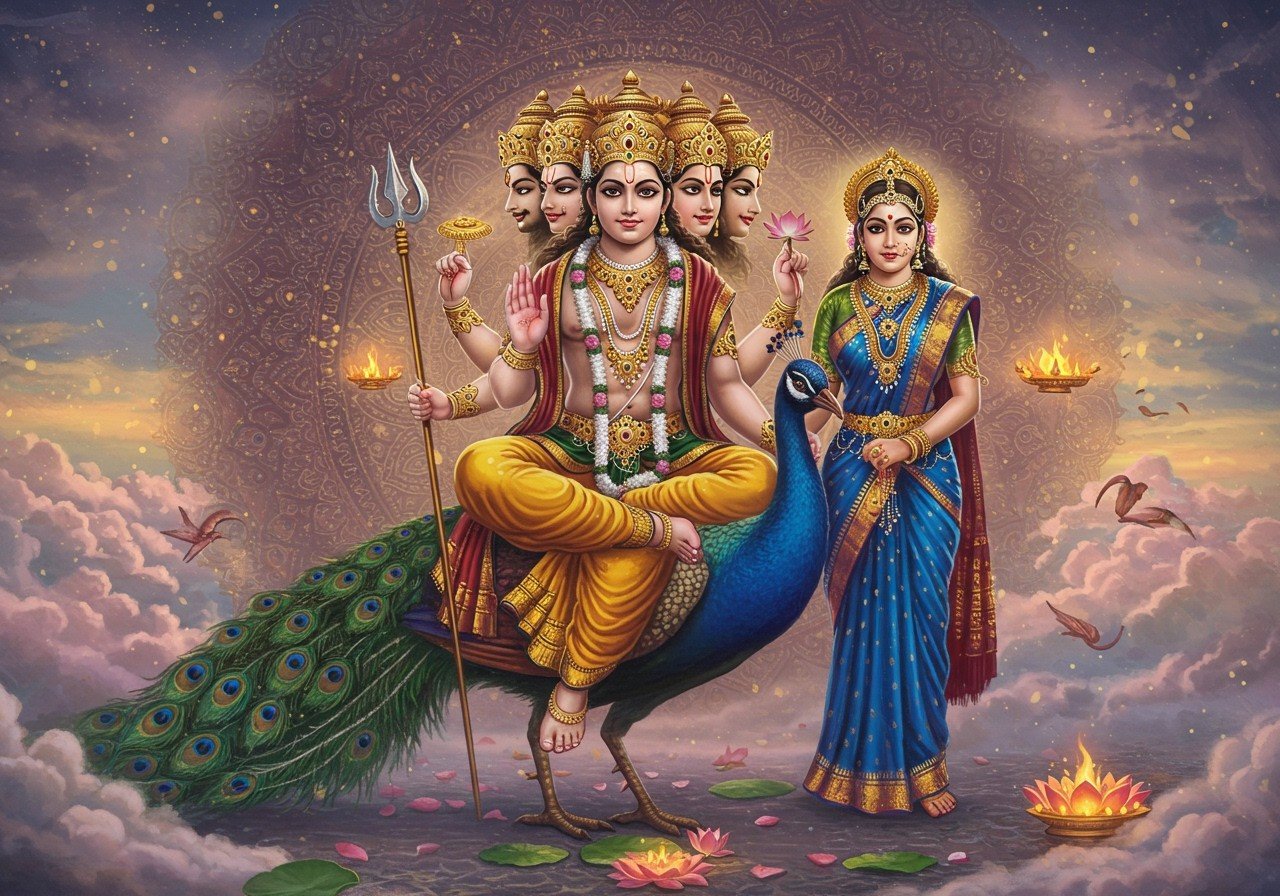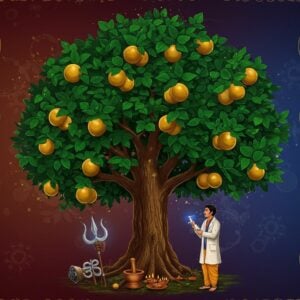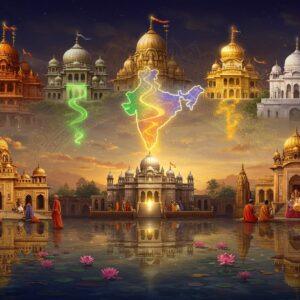
Kartikeya, a prominent deity in Hindu mythology, is celebrated for his valor and wisdom. As the offspring of Lord Shiva and Goddess Parvati, he holds a revered position in the Hindu pantheon. His two consorts, Devasena and Valli, enrich his narrative, providing insights into cultural and religious values. These stories deepen the understanding of heritage for those who appreciate tradition.
Who is Kartikeya?
Kartikeya, also known as Murugan and Skanda, embodies the spirit of war and victory. He is particularly venerated in South India. Often portrayed as a youthful, robust warrior mounted on a peacock, he wields a celestial weapon known as the Vel. His birth narrative is interwoven with celestial occurrences and a divine destiny. Sacred Hindu scriptures, such as the Skanda Purana and the Mahabharata, underscore his significance. You can explore more about Lord Kartikeya in this insightful blog post: Lord Kartikeya: The Divine Warrior Prince.
Kartikeya: The Deity of War and Triumph
Kartikeya, revered as both Murugan and Skanda, commands a prominent presence in Hindu mythology. He holds a significant position as the deity of war and triumph. Especially venerated in South India, Kartikeya is depicted as a youthful warrior astride a majestic peacock. The Vel, his divine spear, symbolizes power and protection. His birth saga, replete with celestial events, reveals his divine purpose. Sacred texts like the Skanda Purana and the Mahabharata emphasize his importance. Discover more about Lord Shiva, Kartikeya’s father, in this blog post: Lord Shiva: The Destroyer Deity in Hindu Religion and about Lord Brahma, another important deity: Lord Brahma: The Creator Deity in Hindu Religion.
Devasena: The Celestial Consort
Devasena, Kartikeya’s celestial spouse, adds depth to his narrative. Recognized as the daughter of Indra, the king of gods, she occupies a distinguished position in the celestial hierarchy. Her union with Kartikeya embodies the convergence of divine forces. Devasena plays a vital role in religious ceremonies and temple worship. Temples dedicated to Kartikeya often commemorate her presence, acknowledging her support of Kartikeya’s divine missions. Her story reflects the values of duty and devotion.
Valli: The Earthly Companion
Valli, Kartikeya’s earthly companion, introduces a unique charm to his tale. Born to a tribal chieftain, Valli represents the terrestrial realm. Her romantic encounter with Kartikeya encapsulates themes of love and devotion. Valli’s character embodies earthly love and passion. Her story is celebrated in folklore and festivities, particularly in Tamil Nadu. Through her narrative, themes of devotion and love are beautifully portrayed.
Symbolism and Significance
Kartikeya’s marriages to Devasena and Valli hold profound symbolic meanings. These unions represent the equilibrium between the celestial and terrestrial spheres. They embody divine duty and human sentiments. These narratives reinforce values such as courage, devotion, and righteousness. Kartikeya’s narratives influence art, literature, and temple architecture throughout India. For a deeper understanding of divine figures and their significance, explore our blog: Poojn.in Blog.
Cultural and Religious Observances
The worship of Kartikeya, Devasena, and Valli encompasses rich cultural practices. Festivals such as Thaipusam and Skanda Shasti celebrate Kartikeya’s exploits and marriages. These festivals strengthen community bonds and cultural continuity. Devotional hymns dedicated to them emphasize their spiritual importance. The practices showcase a harmonious blend of devotion and tradition.
How Poojn.in Aids Your Reverence for Lord Kartikeya and His Divine Consorts
Poojn.in provides essential puja items to facilitate your worship of Lord Kartikeya, Devasena, and Valli with appropriate devotion. Our authentic brass murti collection features meticulously crafted idols of Lord Kartikeya in various forms, including the warrior god Skanda, the youthful Murugan, and the six-faced Shanmukha. We also offer complete puja thalis containing all the necessary items for performing abhishekam and daily worship. Consider this exquisite brass Kartikeya murti for your altar.
For special occasions and festivals dedicated to Lord Kartikeya and his consorts, we offer:
- Pure copper kalash for abhishekam, perfect for sacred rituals and offerings. They are believed to attract positive energy and blessings.
- Traditional bell metal lamps to illuminate your sacred space and invite positive vibrations. Their gentle ringing is thought to purify the atmosphere.
- Sacred threads and malas for prayers and meditation, helping you connect with the divine. They are often used in traditional ceremonies and practices.
- Pure ghee for deepam, an essential offering in Hindu rituals, symbolizing purity and light. Its gentle flame is believed to carry prayers to the deities.
- Natural camphor and dhoop to create a sacred atmosphere during puja. The fragrant smoke is thought to purify the environment and enhance spiritual focus.
- Fresh flowers and garlands (available in select cities) to adorn your deities and create a vibrant, celebratory atmosphere during your worship. Their natural beauty and fragrance add a special touch to the puja.
- Kumkum and vibhuti, traditional sacred powders used in Hindu rituals, symbolizing auspiciousness and blessings. Applying these powders is believed to enhance spiritual connection and protection.
All items are sourced from reputable suppliers who adhere to traditional manufacturing techniques. Our products include detailed usage instructions in multiple languages. We offer pan-India delivery, taking special care to protect sacred items during transit. Enhance your puja experience with our high-quality dhoop dani: Brass Dhoop Dani and another size of Brass Dhoop Dani.
Consider our Mangalam Camphor products to enhance your puja: Mangalam Camphor (Butter Paper) and Mangalam Camphor Tablets.
Visit www.poojn.in to explore our comprehensive selection of puja items for Lord Kartikeya worship. Our customer service team is available to assist you in choosing the most appropriate items based on your specific puja needs.
Conclusion: Embracing Tradition and Unity
Kartikeya’s tales, interwoven with the narratives of Devasena and Valli, impart enduring lessons of unity, love, and devotion. These narratives transcend mere mythological accounts; they reflect values that resonate deeply with many. By exploring the divine and earthly connections through Kartikeya’s marriages, we discover a harmonious balance between duty and emotion.
The rich traditions and festivals that commemorate these stories underscore the significance of cultural continuity. Whether through temple worship, festivals like Thaipusam, or devotional songs, the stories of Kartikeya, Devasena, and Valli continue to inspire. They encourage us to cherish our heritage while embracing the conveniences of modern life. Find more inspiring blog posts at Poojn.in Blog.
In honoring these traditions, we reaffirm our respect for the past and our hope for the future. As we reflect on these divine tales, may they guide us in our daily lives, bringing strength, love, and harmony to our own journeys.
Understanding Kartikeya’s Wives: Devasena and Valli – Mythology & Significance
Who are Kartikeya’s wives? Kartikeya, the Hindu god of war, has two consorts: Devasena and Valli. Both hold significant places in his mythology, reflecting different aspects of his divine nature and earthly connections.
Whom did Kartikeya marry? Kartikeya married Devasena, often associated with Indra, the king of the gods, and Valli, a tribal princess. These marriages, one celestial and the other earthly, symbolize different facets of love, duty, and devotion. They are depicted in various regional interpretations of Kartikeya’s mythology.
What is Devasena’s importance in Kartikeya’s story? Devasena, often seen as the daughter of Indra, represents the celestial realm. Her marriage to Kartikeya is often portrayed as an arranged marriage, highlighting the importance of duty and alliances in maintaining cosmic order. Some interpretations see her as a symbol of power and strength, supporting Kartikeya in his role as a warrior god.
How did Kartikeya and Valli meet? Valli’s story offers a more earthly narrative, focused on love and devotion. Traditionally, she is depicted as the daughter of a tribal chief. Their meeting is often described as a love story, emphasizing Kartikeya’s connection to the earthly realm and his compassion for humanity. In some narratives, Valli is portrayed as having a divine connection herself, sometimes linked to Vishnu in a past life.
What is the significance of Devasena and Valli in mythology? Devasena and Valli, as Kartikeya’s consorts, represent different dimensions of his character and influence. Devasena often embodies celestial power and duty, while Valli represents earthly devotion and love. Together, they symbolize the balance between the divine and the human, a central theme in Hindu mythology. It is important to note that the specific narratives and interpretations of their roles may vary across different regions and traditions in India.
How does Valli’s story emphasize Kartikeya’s character? Valli’s narrative underscores Kartikeya’s compassion, love, and connection to humanity. Her devotion to him, regardless of his divine status, exemplifies the power of faith and love. This aspect of Kartikeya’s story is particularly celebrated in South Indian traditions, especially in Tamil Nadu.
Are Devasena and Valli venerated in any rituals? Yes, both Devasena and Valli are honored in various rituals and festivals, particularly in South India. They are often invoked alongside Kartikeya, symbolizing the interconnectedness of the divine and the earthly. Their worship reinforces the importance of love, devotion, duty, and strength in the context of Hindu religious practices.


